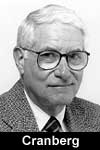Gilbert Cranberg: No Predictions, Please; Just Tell Us What Happened
Posted at 5:15 pm, August 14th, 2007
Those who want to quit Iraq in a hurry and those who believe we should stay have a lot in common: both purport to be able to foretell the future. The predictions are poles apart: the exit-now camp envisions Iraq calming down when the irritant of the U.S. occupation ends; the stay-longer faction foresees that leaving would create chaos.
Both scenarios are plausible, but no one really knows. The point is that much of public policy debate, and of journalism, consists of conjecture about what the future holds but the tools for foretelling it are not much better now than in the days of soothsayers.
Journalists would do the public a big favor if they candidly admitted how much they traffic in fortune-telling. No news organization, or administration, has a soothsayer on staff, but they do have rolodexes loaded with the modern equivalent, “analysts” and “experts” happy to be quoted about what the morrow brings.
For centuries war and the threat of war sent leaders avidly in search of oracles to advise on whether to do battle. As do we. The Vietnam war was brought to us courtesy of seers with visions of Southeast Asia overrun by Communists if we failed to fight in Vietnam. Oops, wrong guess. So, too, with the Iraq war, sold with visions of mushroom clouds and fearsome biological and chemical weapons if Saddam Hussein were left in power to threaten U.S. security. Some of the biggest cheerleaders for the war are still prognosticating, this time about how wonderful things will be just around the corner in Iraq.
The ancients had a wealth of tools to anticipate the future. A favorite was entrails of animals sacrificed for their livers and gall bladders to be read by sages. Other seers would crack animal bones to divine meaning from the angles of the cracks, or study flight patterns of birds, or words uttered by idiots or passersby, or stumbling, or by scattering sticks to learn from their patterns or from drugging people and interpreting their visions.
How could rulers have had confidence in such claptrap, let alone taken their armies to war based on it? But then, consider that 40 percent of Americans, some presumably educated and enlightened, are reported to believe in astrology, and that President Reagan, among the believers, ran his Oval Office on the advice of a California clairvoyant. The White House scheduled the president according to how the seer rated days as “bad,” “very bad,” “possible attempt,” “stay home,” “be careful,” “bad period,” “no outside activity,” and so on.
Journalists are supposed to be skeptics but many of their bosses run astrology features. The newspaper I read regularly scrapped the New York Times and Los Angeles Times-Washington Post news services but prints a dozen inches daily of horoscopes.
While few, if any, journalists favor the occult, much of what they do consists of reporting about what they or their sources believe will or could happen. Journalism is supposed to be about what has occurred, but that often takes a back seat to conjecture and guesswork that a soothsayer might envy.
I recently selected at random an issue of the New York Times and circled the items in which the reporter or a source speculated about the future. Granted that this was neither an exhaustive survey nor a scientific sample, and that the news on that day included the possibility that Chief Justice John Roberts had had an epileptic seizure and that Rupert Murdoch had finalized urchase of Dow Jones, both events that lent themselves to wondering about their future impact. Still, I counted 32 circled items in some half-dozen
stories in this one issue.
Journalism needs to have an awareness of the extent to which what it does is attempting to know the unknowable. The press would have had a lot less egg on its face if, during the run-up to the Iraq war, administration claims about how the war would be a cakewalk, how we would be greeted as liberators, how oil money would help pay the bill and, not least, about the threat Saddam supposedly posed, were presented as the crystal-ball gazing it was.
Just as journalists and the public need to be leery of unnamed sources because their reliability may be suspect, so, too, should both beware of pundits whose take on the future might as well have come from entrails.




